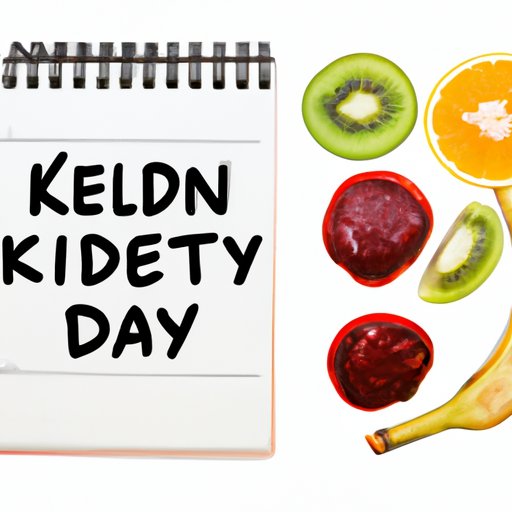
Introduction
The renal diet is a dietary plan that is designed to help people manage various kidney diseases by balancing their nutrient intake. The diet mainly involves controlling the intake of protein, phosphorus, potassium, and sodium. This article aims to provide a comprehensive guide on everything you need to know about the renal diet, including its definition, importance, guidelines, challenges, and complications.
Everything You Need to Know About the Renal Diet: A Comprehensive Guide
The renal diet is a dietary plan that is specifically tailored towards managing kidney diseases. Kidney diseases refer to a range of conditions that can negatively impact the function of the kidneys. The most common kidney issues that require a renal diet include chronic kidney disease (CKD), diabetic nephropathy, and polycystic kidney disease (PKD).
The role of the renal diet is to optimize the kidney’s performance by maintaining a balance between the intake of various nutrients such as protein, potassium, phosphorus, and sodium. This balance helps to minimize the buildup of toxins that can cause more damage to the kidneys.
Some of the nutritional guidelines and restrictions of the renal diet include avoiding high-protein foods, limiting potassium, phosphorus, and sodium intake, and ensuring that adequate caloric intake is maintained.
The Importance of Following a Renal Diet for Individuals with Kidney Disease
The renal diet plays a crucial role in managing kidney health in several ways. For instance:
- Minimizes further damage to the kidneys
- Reduces chronic inflammation
- Regulates fluid balance in the body
- Improves overall well-being
Benefits of adhering to the renal diet include improved kidney function, lowered blood pressure, reduced cholesterol levels, increased energy levels, and a better overall quality of life. On the other hand, not following the renal diet can lead to various complications such as anemia, bone disease, and impaired heart health.
It’s essential to consult with a healthcare professional when following a renal diet, as they can provide advice and guidance on tailoring the diet to individual needs.
A Beginner’s Guide to Understanding the Renal Diet and Its Impact on Kidney Health
When it comes to the renal diet, education is critical for effective adherence. Understanding the basics of the diet is the first step towards a healthier kidney lifestyle.
Some of the food categories that should be avoided or moderated on the renal diet include high-protein foods (meat, poultry, fish, and dairy products), foods high in potassium (bananas, tomatoes, and potatoes), high-phosphorus foods (cola, nuts, and dairy products), and high-sodium foods (processed foods, cheese, and pickled products).
It’s essential to incorporate foods that are low in potassium, phosphorus, and sodium, such as apples, cabbage, carrots, and beans.
Exploring the Benefits and Challenges of Adhering to a Renal Diet
Following the renal diet comes with a range of positive outcomes, such as better kidney function, reduced inflammation, and an overall healthier lifestyle. Nevertheless, adhering to the diet consistently can also present several challenges.
Some common challenges include the lack of variety in food choices, social isolation, and limited convenience food options. However, overcoming these challenges can be achieved through careful planning, creativity, and teamwork.
Here are some tips for overcoming the challenges of the renal diet:
- Plan meals in advance to ensure a balanced nutrient intake every day
- Check food labels to ensure sodium, potassium and phosphorus levels are low
- Experiment with different cooking methods to make renal-friendly meals more interesting
- Invite friends and family over for renal-friendly dinners to feel more connected
- Stay motivated by remembering the health benefits of sticking to the diet
Renal Diet 101: Simple Tips and Strategies for a Healthier Kidney Lifestyle
Meal planning forms an essential component of the renal diet. It’s crucial to plan ahead to ensure a well-balanced and nutritious meal every day. This includes incorporating snacks that are healthy and renal-friendly.
In addition to meal planning, there are several easy and tasty recipes that people on the renal diet can try, including cauliflower rice, oatmeal banana pancakes, and black bean salsa.
Finally, lifestyle changes such as exercise, stress reduction, and quitting smoking complementing the renal diet can further enhance kidney health and overall well-being.
Conclusion
The renal diet is a critical dietary plan for managing various kidney diseases. Adhering to the diet can have many benefits, such as improved kidney function and overall well-being while not following the diet can lead to complications such as anemia and heart issues. To enjoy the full benefits of the renal diet, it’s essential to consult with a healthcare professional, stick to the nutritional guidelines, and overcome the challenges that come with consistent adherence.
Seek medical advice to tailor the diet to your specific needs and remember that proper education, planning, and motivation are essential for a successful renal diet journey.




